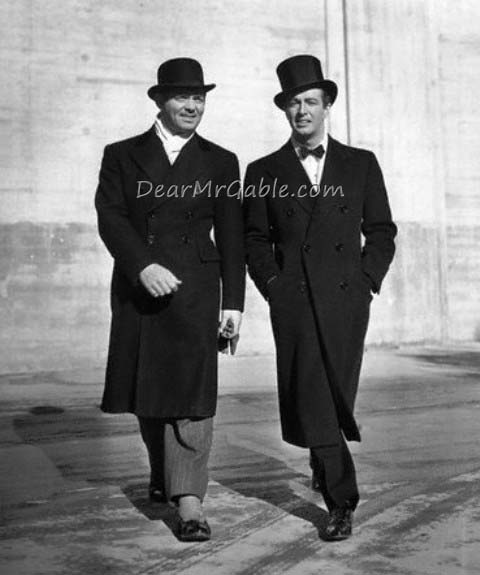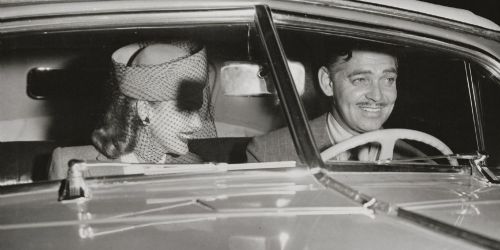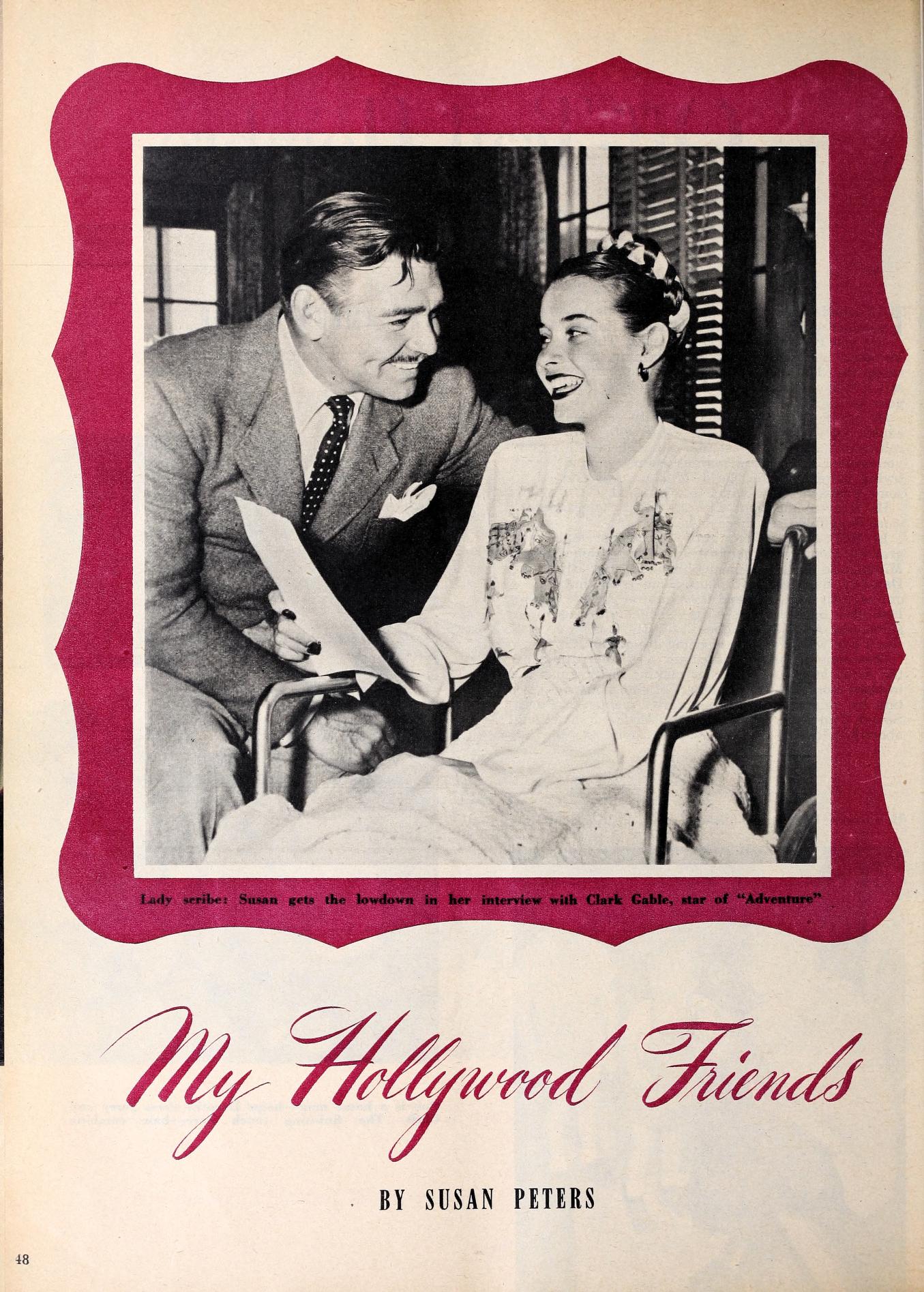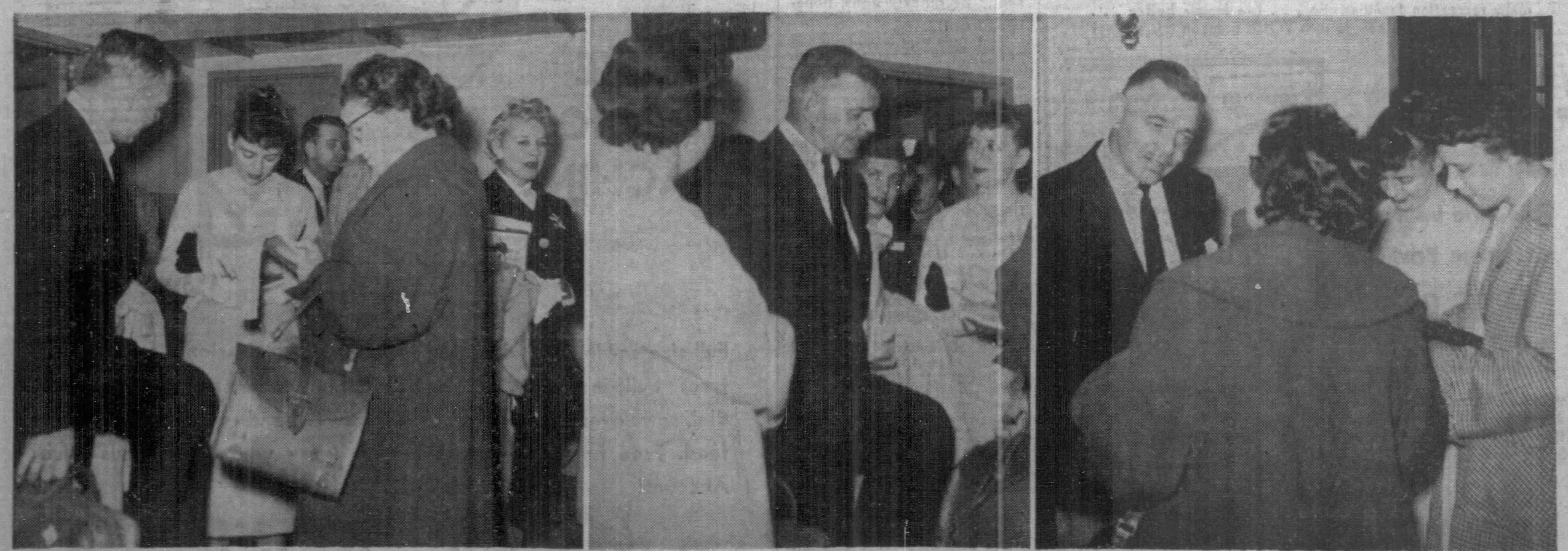{New Article} 1937: Gable and Taylor Rivals?

This 1937 is purely MGM propaganda–“We have two hot male leads! Look at how great they both are!” A bunch of hogwash to think that because they were both leading men they were instantly rivals. Clark and Bob, in fact, grew to be good friends in the years following. Bob and his wife Barbara Stanwyck had a ranch near Clark and Carole’s and the four of them were often together. Only thing worthwhile in this article is some of the quotes:
“I see Mr. Taylor as a rival!” marvels Mr. Gable, spreading his four-square smile. “Never even thought of such a thing. Bob’s a fine boy, a fine-looking boy, a young, healthy, virile, clean, intelligent American boy, and God knows we need more of them in this business. I’m glad he came along. He has taken some of the burden off my shoulders, and I’m grateful to him. I’ve worked plenty. I do too many pictures. I’d rather do less and be seen less. For a long time Bob Montgomery and I were the only leading men on the lot, and we were kept going from one woman star to another. Bill Powell has been here for only the last year and a half. Then Spencer Tracy joined the gang. Now, with Taylor, there are five of us. And as for Bob all I can say, and say it from the heart, is welcome to our Culver City.”
Mr. Taylor is all but diffident as he hesitates to say: “I don’t know how Gable feels about me, but I’d like to be a pal of his. He’s completely a man. When I came here people kept asking, ‘Why don’t you get acquainted with Clark?’ I told them, ‘He doesn’t want any of me.’ You see, I felt he was too big to be bothered with small-fry. So for a long time it was just a case of ‘Hello’ or ‘How are you?’ when we happened to pass on the lot. I’d been a fan of his ever since seeing him in ‘Free Soul’—still am. After that picture I talked about him for weeks, then did more talking when I saw him in ‘The Secret Six.’ But I didn’t have the nerve to talk to him on the lot. Finally there was a matter of business I wanted his advice on, and I got up guts enough to ask him if he’d let me see him about it. He opened up like a book, and he’s been swell ever since. Now we go to lunch together, and I get a big kick out of it. My being a leading man hasn’t made any difference. I couldn’t be a rival of his even if I were chump enough to have any such fool idea.”
I love his description of liking Clark in A Free Soul and being intimidated by him.
“That’s the way I figure myself,” explains Mr. Gable. “When I came into pictures I hadn’t the faintest notion of ever becoming a star. Such a possibility never entered my head. Far from it, I didn’t think I could even be a leading man, for at that time leading men were different from those of today. I wasn’t a pretty boy. And, anyway, they didn’t think much of stage actors then. They’d rather have a good-looking doorman or a truck-driver. My looks, romantically, weren’t worth a nickel. I’d never have got my foot in at all if it hadn’t been for gangster pictures. All that saved me was that I could look tough.”
What do you think, are his looks worth a nickel?? He is right, though. Clark helped usher in a new era of leading man. Gone were the overly romantic, fluffy stylings of Valentino and Gilbert, in were the rough, tough and manly men who would slap your face one minute and take you in their arms the next.
“I was lucky to get anywhere,” Mr. Gable is grateful to say. “It’s all in the luck of the game. But popularity in pictures is very temporary. It may be for this year, then it’s gone forever. You’re up today and down tomorrow. There’s no use trying to keep it up. You just have to struggle along and make the best of it. But the trouble today is that the average beginner wants to start as a star and work down. He needn’t worry about the working-down part—there’s sure to be plenty of people to help him. What has helped me most of all is experience. I’ve had seventeen years of it. Best of all was that I got in theatrical stock companies. It’s unfortunate we haven’t them today, for there’s no other place where an actor gets such valuable training. It’s like an interne learning to be a doctor. Bob Taylor is fortunate for having studied in the studio dramatic class. He came out of it knowing something about the work he was going to do. I only hope there’ll be more like him. We haven’t enough young actors to fill the bill. It is because of the lack of them that there are so many foreign actors in American pictures. Not that I object to them generally. But I don’t think it a good idea to have foreigners play American characters, for no matter how good they are they can’t be convincing. It takes actors like Taylor to play those parts. When I started I was at least what might be called a home-grown, or garden variety of actor. Sprouting in Akron, after coming down from the Ohio back-hills, I was just about as green as they come. With Taylor it was different. He came out of college, where he had played in the dramatic society. But it was simply the glamour of the theatre that got me. I’d sit pop-eyed in the gallery watching the actors and say, ‘Oh God, if I could only do that!’”
It’s interesting what he says about foreign actors in American roles—wonder if he still thought that after starring opposite Vivien Leigh as a certain Miss O’Hara?
You can read the article in its entirety in The Article Archive.


